Army recruitment gets personal
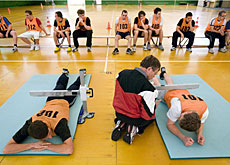
Every able-bodied Swiss male traditionally serves in the country's armed forces after passing through the recruitment process aimed at determining a candidate's aptitudes.
But training a new soldier comes at a great cost to the taxpayer, so the Swiss Army has been using a new method to ensure that those who are unfit for military service are weeded out before they reach boot camp.
Before the new recruitment process started being phased in 2003, 20 to 30 per cent of men who were accepted ended up being sent home within three weeks of starting their training.
Because the acceptance rate has dropped from 85 to 65 per cent, fewer recruits fail to stay the course, saving the government SFr15 million ($12.5 million) a year.
At the Rüti recruitment centre near Zurich, around 140 young men – women do not have to do military service but can sign up voluntarily – are tested week after week.
There is a relaxed atmosphere in the cafeteria, where the latest batch of candidates is waiting. Every now and then a number is called out; someone gets up and makes his way to the examination room.
Gone are the days of everyone standing in a line stripped to their underwear, replaced by three days of tests.
“Since the recruitment process has been organised between seven centres, we place great value on treating the young participants individually and discreetly,” Andres Kunz, the head doctor at the centre, told swissinfo.
During the selection process, all potential recruits who have not been given previous medical dispensation receive a thorough physical check.
Tests
In the centre’s examination room heart rate, lung capacity, hearing and vision are all monitored and a voluntary blood test is carried out to discover physical problems and infections such as hepatitis B or C.
Kunz says the test is voluntary “because it is an invasion of physical integrity”.
A chest x-ray for signs of tuberculosis is also voluntary, and the injection programme – for tetanus, diphtheria, polio and meningitis – requires participants’ consent, which is usually given.
The 90-minute physical test involves jumping from a standing position, throwing a medical ball from a sitting position, an endurance test, and sit-ups. Balance and muscle coordination are also measured – seeing how long participants can stand on one leg, shut their eyes and with their head back.
To get a better idea of the subject’s mental health, cognitive abilities, motivation and suitability to work in a team, participants spend several hours at a computer. Their capacity to understand a text and general intelligence is tested, while a psychological and psychiatric questionnaire is also filled out.

More
Militia army
“Question of honour”
According to a survey in 2005, 50 per cent of Swiss French were against conscription – compared with only 27 per cent of Swiss Germans. But if someone thought it would possible to deliberately botch the answers to the test questions in order to get rejected, they should think again according to Kunz.
“It’s hard,” he said. “You have to answer hundreds of questions and any contradictions are quickly spotted and clarified in an interview.”
However, few of the young men – all German speakers – waiting to be tested at the Rüti centre seemed to want to get out of national service.
“Of course I want to get recruited – it’s a question of honour,” one young man told swissinfo.
Another looked forward to his time in the communications unit – “I’ll be able to learn something”.
And a third had simply done the math. “Because the amount of money that rejected people have to pay as compensation is currently so high, I simply can’t afford not to be considered fit for service,” he said.
swissinfo, based on a German article by Ulrich Goetz
During the Cold War, the Swiss Army numbered 600,000 men who could be called up at short notice.
In 1995 the army was reduced to 400,000 and today it is 220,000.
Today, able-bodied males between the ages of 20 and 36 must serve 260 days of military service.
Military service is optional for women and Swiss living abroad.
In Europe, general and obligatory conscription exists only in Switzerland, Austria and Scandinavia.
There are regional differences of opinion: 50 per cent of Swiss French are against conscription compared with 27 per cent of Swiss Germans.
45 per cent of Swiss French want to maintain conscription compared with 69 per cent of Swiss Germans.
Swiss German is spoken by 63.7 per cent of Swiss, French by 20.4 per cent.

In compliance with the JTI standards
More: SWI swissinfo.ch certified by the Journalism Trust Initiative
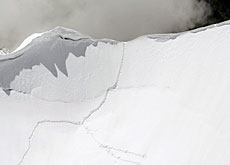
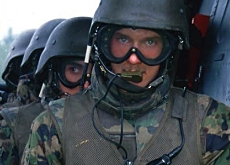
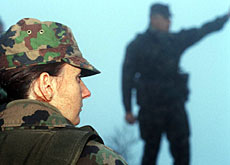
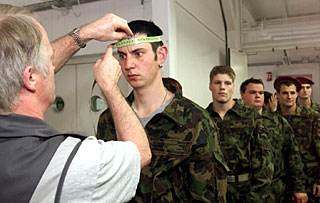
You can find an overview of ongoing debates with our journalists here. Please join us!
If you want to start a conversation about a topic raised in this article or want to report factual errors, email us at english@swissinfo.ch.